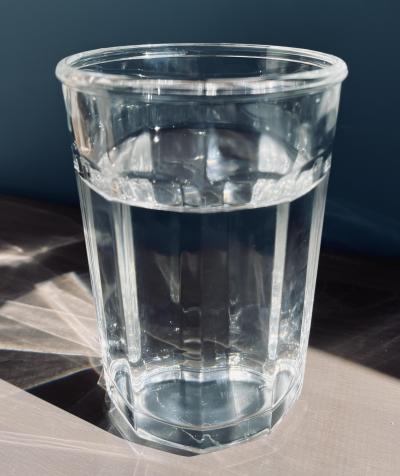The Faucet of Youth
Scientists Explore Links Between Hydration and Aging
Legend has it that Spanish conquistador Juan Ponce de León scoured the Caribbean and Florida for the fabled fountain of youth. He never found it. In a twist of fate, he died prematurely from wounds sustained during a skirmish with native warriors. Could an antiaging elixir exist today? Perhaps look no further than a glass of water.

Being well hydrated is associated with a range of health benefits including a lower risk of developing chronic diseases and a higher chance of living longer than in those who may not get sufficient fluids, according to a recent study by researchers at the National Heart, Lung, and Blood Institute (NHLBI) (eBioMedicine 87:104404, 2023).
In addition to supporting essential body functions, previous NHLBI research has suggested that consuming enough fluids throughout life may also reduce the risk of severe heart problems (Eur Heart J 43:3335-3348, 2022). And well-controlled mouse studies (also conducted by NHLBI researchers) have shown that lifelong water restriction increased serum sodium concentrations and shortened the mouse lifespan by six months—equivalent to about 15 human years (JCI Insight 4:e130949, 2019). Those chronically hypohydrated mice also developed degenerative changes in multiple organ systems much faster than control mice.
Could insufficient fluid intake speed up our own aging clock? The NHLBI team used serum sodium concentration as an indicator of hydration status to find out whether poor hydration in middle age might also be associated with accelerated aging. Not drinking enough fluids is the most common cause of elevated serum sodium and, as it turns out, might also lead to poor health.
“We found that adults with serum sodium concentrations greater than 142 millimoles per liter [mmol/L] had a higher risk of accelerated aging and were more likely to die at an earlier age,” said lead investigator Natalia Dmitrieva, adding that physicians could use this threshold to further evaluate patients and advise them on better hydration habits. That newly identified sodium threshold is well within the normal range of 135-146 mmol/L and would not typically be flagged during a routine blood test (Eur Heart J 43:4438-4439, 2022).
The researchers analyzed health data from 11,255 people gathered during five medical visits over a 30-year period as part of NHLBI’s ongoing Atherosclerosis Risk in Communities (ARIC) study. That study began enrolling middle-aged adults in 1987 from four United States communities and has followed them for over 25 years. The first two medical check-ups were performed three years apart when participants were in their 50s, and the last when they were between ages 70 and 90. People whose serum sodium was outside the normal range at the initial visits and those with certain preexisting conditions were excluded from the analysis.
As we age, health markers such as blood pressure and cholesterol usually increase. When those markers rise rapidly a person becomes biologically older than their actual age. People whose health metrics change slower are considered biologically younger. Using 15 health markers, the NHLBI team assessed the biological age of ARIC study participants at middle age and then evaluated how serum sodium correlated with the biological age. “When I pushed the button and plotted all [the data] it was really surprising to see that participants with higher sodium were biologically older than their actual age,” said Dmitrieva.
Individuals who were biologically older than their actual age at baseline had an approximately 30% higher risk of dying younger and were about 35% more likely to develop chronic diseases such as heart failure, dementia, chronic lung disease, and stroke compared with the biologically younger participants. And salty serum did indeed have predictive value. The odds of being biologically older than one’s chronological age were increased by 10–15% for serum sodium exceeding 142 mmol/L. Those odds jumped to approximately 50% for concentrations exceeding 144 mmol/L compared with participants with serum sodium below 142 mmol/L.
Future studies could look at the mechanisms of how hydration directly influences aging. One theory is that poor hydration habits trigger chronically high levels of hormones that regulate water balance in the body, such as antidiuretic hormone (ADH). ADH acts on the kidney to conserve water but also affects all organs and might be responsible for a slow accumulation of tissue damage that eventually leads to chronic disease.
The NHLBI team has plans to analyze how individual chronic diseases might be separately linked to hydration status. They note that the new findings don’t prove causality and that intervention studies are needed to confirm the link between hydration, biomarkers of hydration such as ADH, and aging.
Population surveys have shown that approximately 50% of people worldwide don’t drink the recommended amount of water. This could be due to factors such as thirst sensation, which diminishes as we age, or family habits, perceptions, and traditions. “People have to pay attention to how much they drink,” said Dmitrieva. “Don’t rely on that thirst sensation or waiting to drink only at meals.”
Individual water needs vary. The National Academies of Medicine suggest that most women consume around 6-9 cups of fluids daily. For men, it’s 8-12.
This page was last updated on Friday, March 17, 2023
